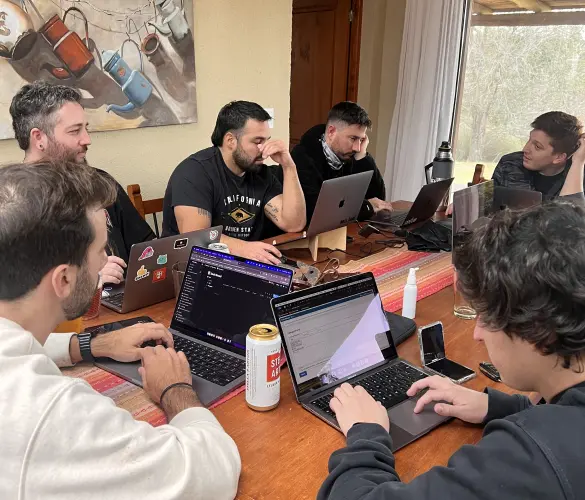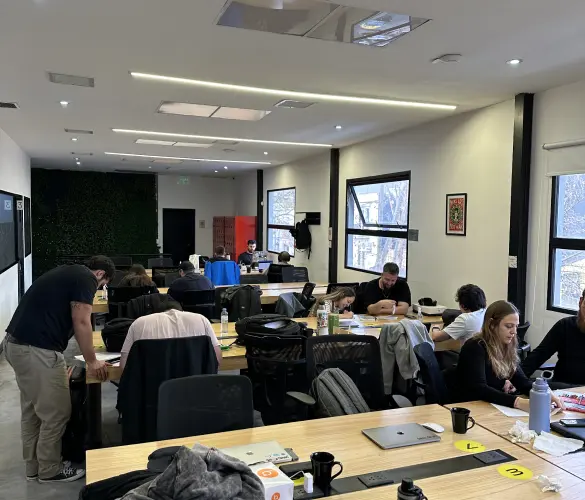“How much does it cost to hire a WordPress developer?” That’s a question many businesses and personal brand owners ask themselves when facing the need to build a website.
Being the most popular content management system worldwide and having such a large developer base, WordPress is a very common go-to choice in these situations. But once that decision is made, you must also consider the monetary costs of building and maintaining a website.
This article delves into the factors that influence how much it costs to hire WordPress developers and when is the right time to do so.
Average cost to hire a WordPress developer

WordPress developers charge based on hourly rates. These rates vary significantly based on various factors. Still, they are usually in the $20 and $150 per hour range, with the most likely range being between $40 and $80 per hour.
A developer’s rates vary because there’s no hard and fast industry standard for salaries, leading to significant gaps between estimates. To give you an idea of how much they can vary, here’s the average annual wage for WordPress developers according to multiple sources:
- Glassdoor: $69,428 per year or $33.42 per hour.
- Indeed: $73,580 or $35.52 per hour.
- Zip Recruiter: $89,076 per year or around $43 per hour.
- Simply Hired: $55,197 per year or $26.65 per hour.
- UpWork: $31,065 to $57,988 per year or $15 to $28 per hour.
Now let’s explore the factors that lead to such a wide range of hourly rates.
Factors that influence the cost to hire a WordPress developer
Freelance or agency

Developers from a WordPress development agency generally charge more per hour than freelancers. In addition to paying their developers, agencies must pay other employees like project managers and marketers for their physical infrastructure’s upkeep.
On the other hand, freelance WordPress developers work independently and, as a result, can charge less per hour.
Keep in mind that freelance developers can be a great affordable option for basic websites, but agencies are better suited for large and complex projects.
Experience
Generally, the more experienced the developer, the more they charge per hour. More experienced developers have a deeper understanding of how WordPress works and can handle more complex projects.
Experienced developers likely also have a long track record of successful projects, allowing them to command higher pay. Finally, having valuable specialized skills like plugin development or ecommerce integration leads to higher wages.
The salary difference between senior and junior developers can be significant. While a junior may charge $20-$30 per hour, a senior can be closer to the $80-$100 per hour range.
Location
Along with experience and whether the developer is a freelancer or part of an agency, location is the most important factor in WordPress developer hourly rates.
Developers who live in countries with a higher cost of living and higher demand are more likely to charge more per hour than those in countries with lower costs of living, less demand, or both. This works both domestically and internationally.
For example, an American WordPress developer living in a rural area will likely charge less than one who lives in the New York metro area, given the disparity in the cost of living and local competition. Additionally, freelancers and WordPress agencies located in countries with lower costs of living than the US, Canada, Australia, and most of Europe will likely be more affordable but not necessarily less skilled.
Exploring highly experienced and skilled WordPress agencies outside the most expensive countries can be an excellent way to contract top talent for less.
Skills

We already mentioned specialized skills above, but they deserve a separate point due to how much they can influence WordPress developer rates. Some of the most sought-after specialized WordPress skills include ecommerce development and custom theme and plugin development.
This separation of skills and tasks leads to different types of WordPress developers and varying rates for different team members within the same agency.
Ultimately, if your project requires more than basic web development, you need to be ready to pay higher rates for the necessary skills.
The complexity of the project
More complex projects cost more time, resources, and specific skills. Hourly rates for basic websites may be in the $20-$60 per hour range, but the larger and more involved the process gets, you can expect rates to increase, sometimes exceeding $100 per hour.
Some of the elements that add complexity to a WordPress development project and increase hourly rates include the following:
- Custom plugin and theme development.
- Ecommerce functionality.
- Multisite development.
- API integrations.
Paying models for WordPress development projects

White Canvas and many other WordPress development agencies mainly operate on two basic paying models when estimating how much to charge for a WordPress development project: closed-scope and time & materials.
Closed-scope
Closed-scope projects charge a fixed amount based on the estimated website development costs. Generally, the estimated project completion time is multiplied by an hourly rate.
The main factor behind the hourly rate is the developer’s hourly rate. Still, other upkeep factors related to the company’s infrastructure maintenance (utilities, equipment, etc.) may also play a role.
Time & materials
In this model, the client agrees to pay based on the time and resources necessary to complete the project. This model results in ongoing monthly invoices until the project is completed. Again, the main factor behind the final invoice is the developer’s hourly rate.
Despite the ongoing nature of this model, clients and developers/agencies already have an estimate of the monthly hours worked and how many months it’ll take to complete. For example, if a single developer is assigned to a project, clients can expect approximately 160 hours of work per month and monthly costs will be the multiplication of those hours with the hourly rate.
When do you need to hire WordPress developers?

Finally, it’s worth asking yourself, “do I really need to hire a WordPress developer?” It’s an important question. The answer depends on your needs, time availability, budget, and skills. As a general rule, you should hire a WordPress developer if:
- You lack technical expertise. WordPress developers understand WordPress architecture, have database management knowledge, and also know how to code in PHP, HTML, CSS, and JavaScript.
- You require custom functionality. Available plugins and themes have limits to what they can do. If your website requires functions beyond those limits, hiring a WordPress developer will benefit you.
- Your website will need to be complex. Large and complex websites integrating with third-party systems are better suited for professional development teams than individuals.
- You have a tight deadline. If you need to complete the project by a specific date, a WordPress development agency may be the best choice, given their project management experience and developer availability.
Final thoughts
WordPress developer salary varies based on many factors, including experience, location, specialized skills, project complexity, and whether you contracted them as freelancers or as a resource from a WordPress development agency.
Due to these factors, WordPress developer hourly rates may range from a little over or under $20 to $100 and above, with the most likely range being $40 to $80.
Carefully consider the hourly rate with their services to decide whether to contract a WordPress developer.
If you found this article helpful, consider reading our blog for more WordPress guides, tips, and insights.
Related Articles

Business / 12 min read
Business / 12 min read
How to Take on More WordPress Development Projects While Maintaining Quality
As a digital agency that provides WordPress services, your job is to take on as many projects as possible while maintaining the highest quality. This is easier said than done…
Read More
Business / 9 min read
Business / 9 min read
How to Choose a WordPress Development Agency to Scale Your Projects?
When your agency starts to scale, you may decide that a big part of your expansion will be providing WordPress services. If that's the case but you don't have an…
Read More
Business / 7 min read
Business / 7 min read
How to Optimize Time and Resources in WordPress Projects
WordPress agencies need to optimize and human resources use in order for their services (development, QA, design, etc.) to be profitable. They need to plan these projects very thoroughly to…
Read More
Business / 11 min read
Business / 11 min read
How WordPress Outsourcing Can Help Scale Your Agency
WordPress development outsourcing is becoming more frequent and affordable every day, helping global digital agencies of all sizes scale their services without the long-term investment of hiring an in-house team.…
Read More
Business / 8 min read
Business / 8 min read
What Is a White Label WordPress Development Agency?
A white label WordPress development agency is a company of WordPress developers, QA analysts, and project managers who provide outsourced services to digital agencies that lack a development team. Importantly,…
Read More
